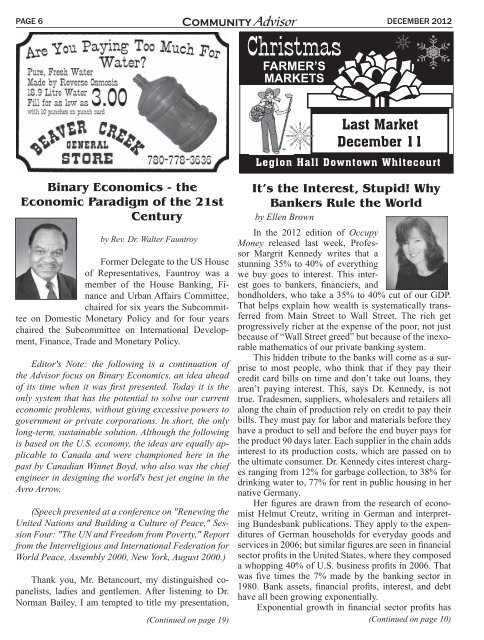Advisor - WhitecourtWeb.com
Advisor - WhitecourtWeb.com
Advisor - WhitecourtWeb.com
You also want an ePaper? Increase the reach of your titles
YUMPU automatically turns print PDFs into web optimized ePapers that Google loves.
PAGE 6 Community <strong>Advisor</strong> DECEMBER 2012<br />
Christmas<br />
FARMER’S<br />
MARKETS<br />
Last Market<br />
December 11<br />
Legion Hall Downtown Whitecourt<br />
Binary Economics - the<br />
Economic Paradigm of the 21st<br />
Century<br />
by Rev. Dr. Walter Fauntroy<br />
Former Delegate to the US House<br />
of Representatives, Fauntroy was a<br />
member of the House Banking, Finance<br />
and Urban Affairs Committee,<br />
chaired for six years the Sub<strong>com</strong>mittee<br />
on Domestic Monetary Policy and for four years<br />
chaired the Sub<strong>com</strong>mittee on International Development,<br />
Finance, Trade and Monetary Policy.<br />
Editor's Note: the following is a continuation of<br />
the <strong>Advisor</strong> focus on Binary Economics, an idea ahead<br />
of its time when it was fi rst presented. Today it is the<br />
only system that has the potential to solve our current<br />
economic problems, without giving excessive powers to<br />
government or private corporations. In short, the only<br />
long-term, sustainable solution. Although the following<br />
is based on the U.S. economy, the ideas are equally applicable<br />
to Canada and were championed here in the<br />
past by Canadian Winnet Boyd, who also was the chief<br />
engineer in designing the world's best jet engine in the<br />
Avro Arrow.<br />
(Speech presented at a conference on "Renewing the<br />
United Nations and Building a Culture of Peace," Session<br />
Four: "The UN and Freedom from Poverty," Report<br />
from the Interreligious and International Federation for<br />
World Peace, Assembly 2000, New York, August 2000.)<br />
Thank you, Mr. Betancourt, my distinguished copanelists,<br />
ladies and gentlemen. After listening to Dr.<br />
Norman Bailey, I am tempted to title my presentation,<br />
(Continued on page 19)<br />
It’s the Interest, Stupid! Why<br />
Bankers Rule the World<br />
by Ellen Brown<br />
In the 2012 edition of Occupy<br />
Money released last week, Professor<br />
Margrit Kennedy writes that a<br />
stunning 35% to 40% of everything<br />
we buy goes to interest. This interest<br />
goes to bankers, financiers, and<br />
bondholders, who take a 35% to 40% cut of our GDP.<br />
That helps explain how wealth is systematically transferred<br />
from Main Street to Wall Street. The rich get<br />
progressively richer at the expense of the poor, not just<br />
because of “Wall Street greed” but because of the inexorable<br />
mathematics of our private banking system.<br />
This hidden tribute to the banks will <strong>com</strong>e as a surprise<br />
to most people, who think that if they pay their<br />
credit card bills on time and don’t take out loans, they<br />
aren’t paying interest. This, says Dr. Kennedy, is not<br />
true. Tradesmen, suppliers, wholesalers and retailers all<br />
along the chain of production rely on credit to pay their<br />
bills. They must pay for labor and materials before they<br />
have a product to sell and before the end buyer pays for<br />
the product 90 days later. Each supplier in the chain adds<br />
interest to its production costs, which are passed on to<br />
the ultimate consumer. Dr. Kennedy cites interest charges<br />
ranging from 12% for garbage collection, to 38% for<br />
drinking water to, 77% for rent in public housing in her<br />
native Germany.<br />
Her figures are drawn from the research of economist<br />
Helmut Creutz, writing in German and interpreting<br />
Bundesbank publications. They apply to the expenditures<br />
of German households for everyday goods and<br />
services in 2006; but similar figures are seen in financial<br />
sector profits in the United States, where they <strong>com</strong>posed<br />
a whopping 40% of U.S. business profits in 2006. That<br />
was five times the 7% made by the banking sector in<br />
1980. Bank assets, financial profits, interest, and debt<br />
have all been growing exponentially.<br />
Exponential growth in financial sector profits has<br />
(Continued on page 10)














